Ep 81 How to Use Other Teachers' Videos in Your Flipped Classroom
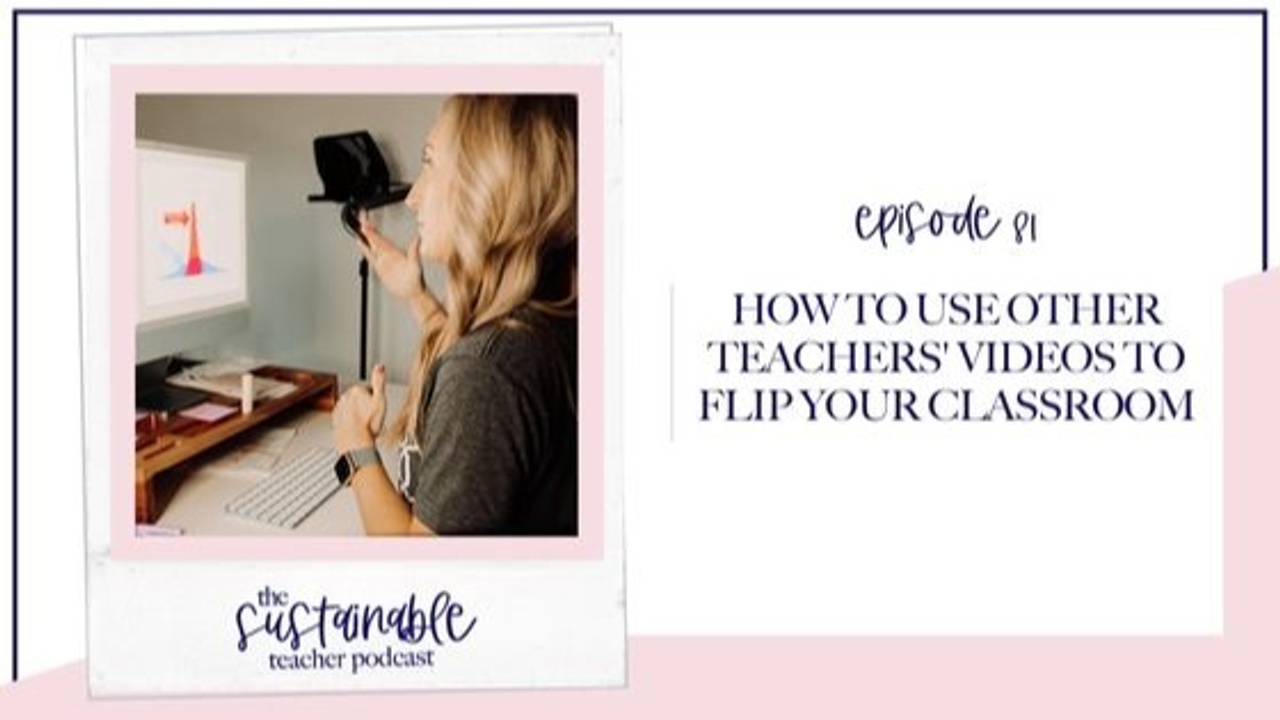
I teach teachers how to flip their classrooms, and when I do, we spend a good chunk of our focus on making their own videos. I definitely recommend making your own videos in your flipped classroom, but sometimes it can be too large of an obstacle and stops you from even starting.
If that is the case, then using another teacher's videos may be the exact solution you need.
It truly can be a beautiful, interdependent relationship that your students can thrive in and benefit from.
In this episode, we're going to talk about situations where using another teacher's videos is a must and how to go about doing it well.
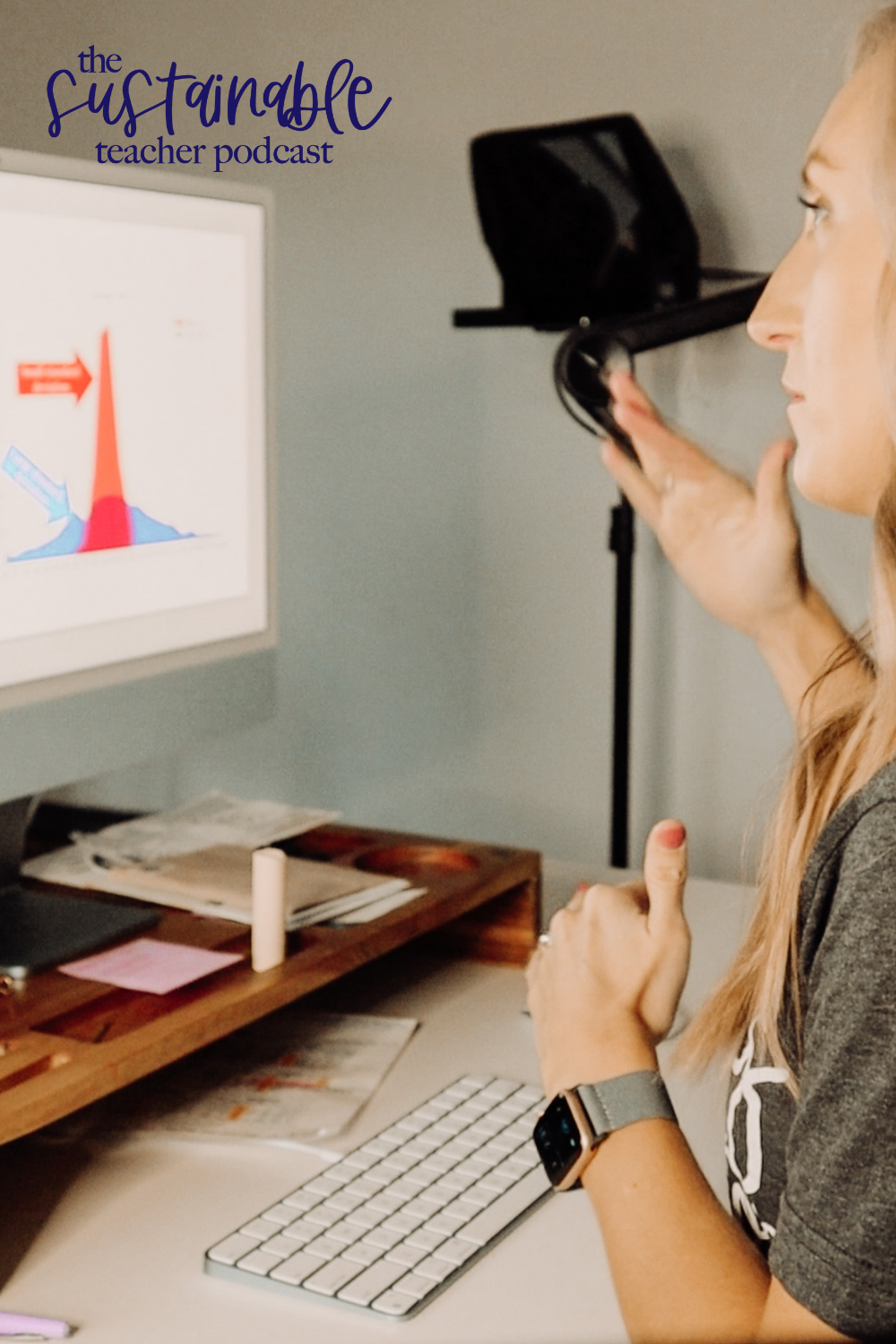
5 Steps to Start Flipping Your Classroom Printable
Hey! Did you know that I have a quick start guide to flipping your classroom ready and waiting for you to download and use to your advantage when you decide it’s high time to be more effective with your students but in ways that are more sustainable for you?
Well, I do.
And it’s an easy click away at the link down in ...
Throw Away Your Teacher Planner and Do This Instead

Hello there and welcome back to the Sustainable Teacher, I am your host Mandy Rice, and I’m so excited you’ve joined us for another episode of teacher inspiration and encouragement packaged into recommendations and tips to help make your teacher-life a bit more sustainable. Because we are all about helping you have BOTH in your life. What do I mean by that, you might be asking???
Well, I mean you should have BOTH an effective classroom AND a thriving personal life. You shouldn’t have to sacrifice one for the other, and I’m hoping today’s episode, as well as this podcast as a whole, helps you take one step closer to that truth.
Starting with this episode, I am excited to announce that each of our episodes will now also be available in video format on my YouTube channel, so if you’re listening to the podcast head to the link in the description to check out the YouTube video that will give a visual glimpse into today’s topic.
Which is….Throw Away your Traditional Teacher Planner ...
How the Pandemic has Changed Our Students and How Teachers Can Respond
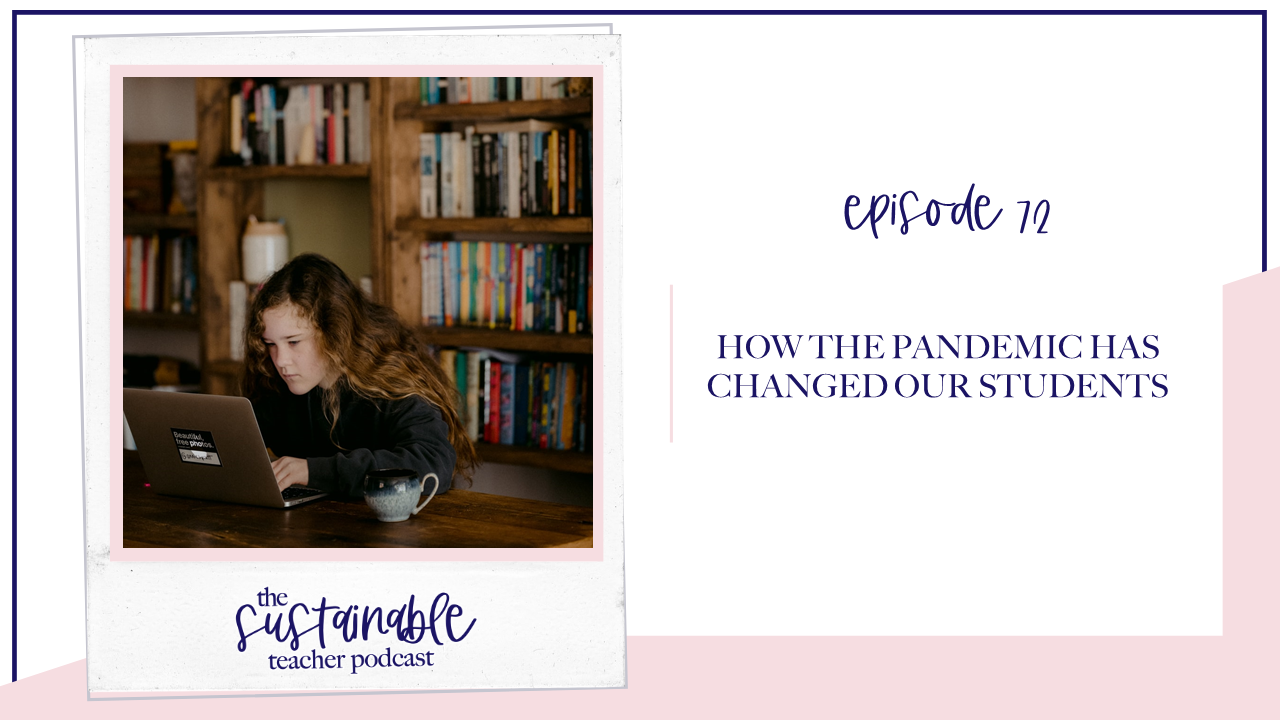
The pandemic took all the routines and understandings about school, shook them up in a paper bag, and spit them out with no semblance of what they once were.
At least that’s how some of our students are now behaving.
With student apathy and absences on the rise as expectations and stakes for students and teachers remain the same, we are working through trying times in education.
Education is different. Our students are different. And if we don’t respond to how our students have changed, we will not be as effective with them in our classrooms.
We must change with our students but in a way that does not sacrifice our evenings and weekends to do so. I’m all for changing with the times and responding to the ever changing needs of our students, but I believe it is absolutely contradictory to the system’s success if we do so at the sacrifice of our teachers’ well being. And requiring that they do it all without support will lead to the end of education as a whole because teachers w...
Make the Most of Class Time So You Can Leave on Time

Quick question for you… when you were in college as a pre-service teacher, making your preparations to become a teacher, taking all your education classes, did you ever take a class on how to lecture?
Me neither.
Another question, when you were assigned to make plans for an entire unit, like a curriculum map for a unit in one of those college classes, did you plan to lecture in class 80%+ of the time and say that out loud to your class?
Yeah, me neither.
That’s because as a pre-service teacher you were being trained on how to best help your students through the learning process, you spent thousands of dollars on your education to become the expert on the learning process, and now that you are actively in the classroom, let’s face it… you’re an overpaid lecturer if that’s all you do.
Oh man. I may have just ticked off a lot of people, but let me explain real fast.
I don’t believe lecturing is bad. Seriously, I don’t. Some of the best teachers I ever had were artists at lecturin...
Leading a Sustainably Epic Classroom with Trevor Muir

Hey there teacher-friend and welcome back to the Sustainable Teacher Podcast, I’m so glad you’ve chosen to join us today, and man have you picked a good episode to land on. I am so excited to have Trevor Muir on the podcast today.
Trevor’s roots are as a high school English teacher, and is now teacher, author, and speaker. He is the author of the books The Epic Classroom and The Collaborative Classroom. Trevor is a teacher at Grand Valley State University, was a national faculty member for the Buck Institute for Education, and is one of the Andrew Gomez Dream Foundation speakers. His work has been featured in the Huffington Post, Edutopia, EdWeek, and WeAreTeachers. He gave a TED Talk titled, "School Should Take Place in the Real World," at TEDxSanAntonio. Trevor’s Facebook page, The Epic Classroom, has inspiring videos that have been viewed over 30 million times. At the heart of Trevor’s work is the conviction that every student has the potential for greatness, and every teacher ...
Student Reflection: How You Make It Happen

Welcome to the Sustainable Teacher and what is part two of this series on student reflection. Last week we discussed the what and the when, so be sure to go back and give episode 62 a listen if you haven’t already, and today’s episode we’re focusing on the how of student reflection.
Now, if you’re anything like me and the hundreds of teachers I’ve worked with, you already are feeling a bit anxious about spending class time on student reflection rather than content, so it’s important to make sure the student reflection is efficient while remaining authentic. Last week I gave tips on how you can keep the reflection authentic, and today we’ll talk about how to keep it efficient and effective.
After listening to this episode, you’ll have a clear picture of how you can implement effective and time efficient student reflection strategies in your classroom so that your students are empowered in their learning and investing more in the learning process that will ultimately impact their ...
Student Reflection: What It Could Look Like
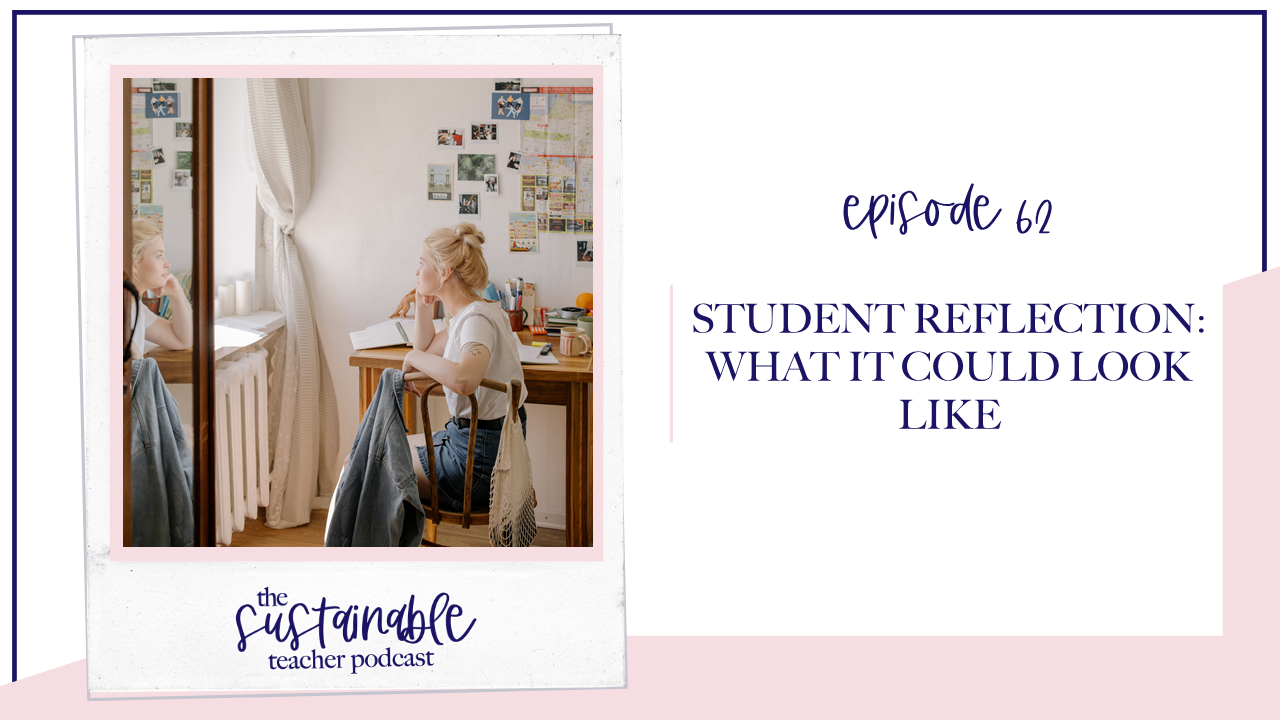
Here at Teach On A Mission and the Sustainable Teacher, we believe that building a sustainable classroom includes a very important player… which is, your students. Empowering your students as learners is one of the most sustaining strategies you can implement in your classroom.
And that is what today’s episode is all about, empowering students in the reflection process, showing you exactly what student reflection can look like, giving you practical strategies to get your students doing some meaningful reflection tomorrow.
Because you know the value of hard work in the learning process, you understand the connection between effortful processing and performance on assessments, you understand the value in engaging in your classroom.
Students don’t always see that, you know this. You also know that telling them the value in all of these things isn’t going to do it for many of them.
Enter stage left, reflection that helps students make the effort-to-performance connection. Now it’...
My Goals, Planner & Calendar

You’ve heard the saying out-of-sight-out-of-mind, which in most contexts refers to distraction tactics of an infant or toddler. But I’m here to burst everyone’s bubble and say that out-of-sight-out-of-mind is a very real occurrence for adults, especially when it comes to our goals, but not in a good way like it is for toddlers.
Instead of being able to use it to our advantage, though, the out-of-sight-out-of-mind concept robs us of accomplishing our goals each year if they aren’t something that has to do with our daily lives or we’re otherwise trying to get outside our comfort zone.
For instance, it’s easier for someone to accomplish a goal of working out everyday if they work at a gym. They have the constant reminder and opportunity. But for a teacher, especially when it comes to their personal goals, we are so focused on what we do as educators everyday and then don’t have much mental space leftover to focus on our goals at the end of each day or week.
What this means is t...
Top 5 Attributes of My Classroom Culture

Welcome back to the Sustainable Teacher blog episode 56, the Top 5 Attributes of a Sustainable Classroom Culture, and here’s the very first thing I want to say.
I think there should be an entire college course on classroom culture. I don’t say that about many things. I teach Intro to Educational Technology, and I think a course on classroom culture should come first. And here’s why… because it’s one of the top, if not THE top factor that will determine your sustainability and impact in your career.
It’s this awesome mix of knowing what you believe as an educator and making sure you always act from that space, helping you to recognize that your impact is greater than any mastered standard or test score.
So, I’ve got five of them for you today, and they each of a message of sorts that you could be sending to your students. And they are a part of a sustainable classroom culture because they compromise the messages, systems, beliefs and actions of your classroom that determine how...
Do You Really Want A Job You Don't Have To Take Home?
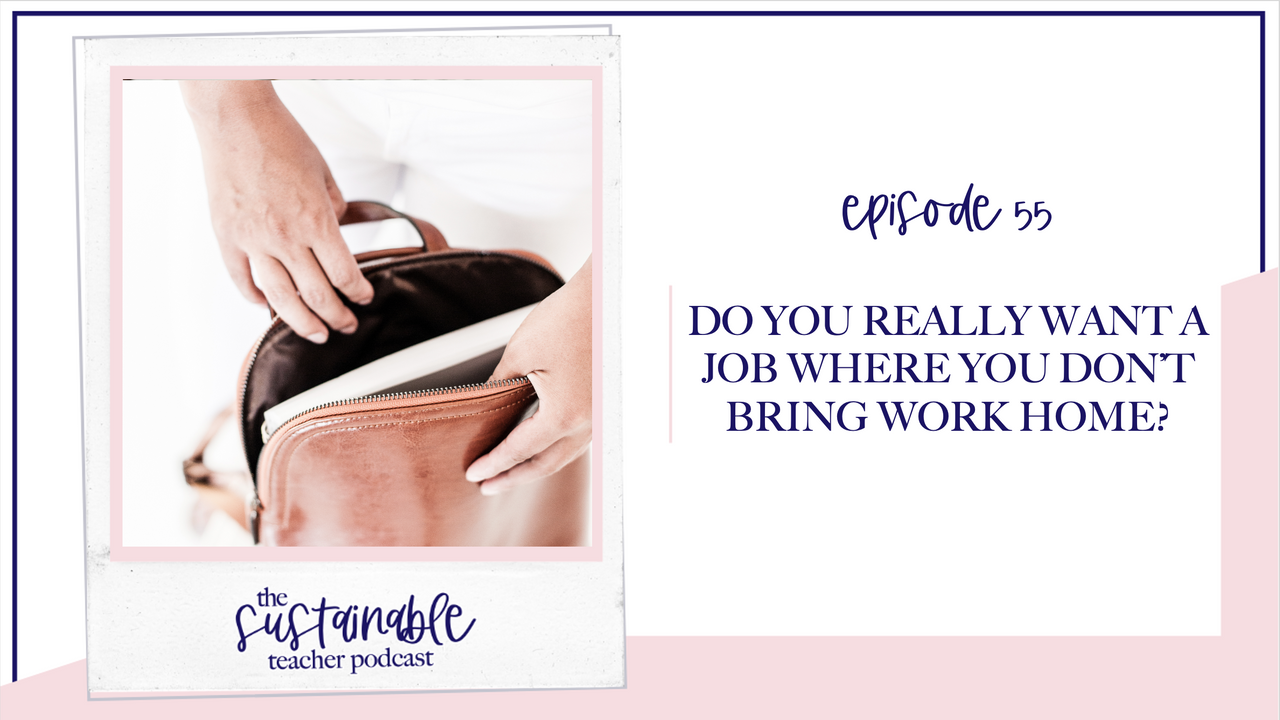
As I’m sitting to write this episode, I’m in an approximately six square feet space in the cab of our pick up truck pulling our camper on our way home from our Christmas vacation with three boys and our dog. I’m reflecting on what was by far our best camper-trip yet as it was at the beginning of winter and was full of sunshine which we Midwesterners aren’t used to in December.
It was a great refresh.
But you know what I thought about quite a bit? Work.
Not in a way that was stifling to my or our enjoying the trip. Not at all. We just had a lot of relaxation time. And that meant my mind was able to wonder and think and plan.
And it reminded me of how I was with my classroom when on a break or vacation.
When I was able to step back from it, I was able to think about it in a clearer way. I was able to work on my classroom rather than in my classroom.
Today I’m asking you the question, in a very non-rhetorical way, do you really want a job you don’t have to take home, becaus...


